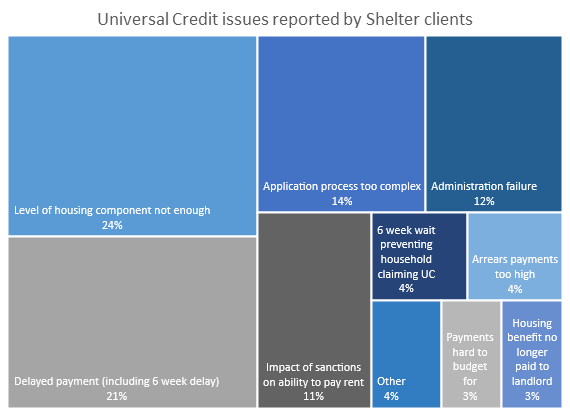On Universal Credit, the government is ignoring the elephant in the room
Published: by Heather Spurr
As Philip Hammond prepares for this week’s Budget, it looks increasingly likely that he will concede on making some changes to Universal Credit (UC). Faced with opposition from his own backbenchers, who have challenged him with distressing tales from their constituencies, Mr Hammond may opt to reduce the six week waiting time for the benefit.
If so, it will be welcome. We have been calling for changes for long enough. Our frontline workers are seeing families reduced to destitution because they are forced to wait for weeks without any money at all.
But would a concession on waiting times fix the problem? While this would be a good first step, we think ministers are still ignoring the elephant in the room: the actual amount of benefit you receive when you finally get it.
Rising rents, frozen benefits
Most working-age benefits are currently frozen, and housing benefit for private renters has suffered real-term cuts since 2011. The same problem will apply for Universal Credit claimants. Under UC, private tenants who need help with their rent will have to apply for the ‘housing cost element’. Just like under housing benefit, the amount you can get is capped by your Local Housing Allowance (LHA) rate. These rates vary locally but are set by government.
LHA rates will be frozen until 2020. When added to the previous real-terms cuts, the consequence is that rates no longer reflect the true price of market rents. This means that government support for housing costs – in housing benefit and UC – is no longer enough to prevent families from becoming homeless. The number of families living in temporary accommodation has leaped from 49,000 in 2011 to 77,000 today. Losing a home due to the loss of a private tenancy is now the most common reason for homelessness, a fact acknowledged by the National Audit Office’s recent investigation into homelessness.
Consider the evidence from our clients who have come to us for help. Since the beginning of 2016, we have opened cases for 115 homeless clients, and 582 who are at risk of homelessness – where problems with UC have either caused or contributed to the housing issues they are facing.
Wider problems
Let’s delve deeper into the data: our analysis shows that delays in receiving UC payments (sometimes in addition to the official six-week period) are not the only issue for our clients. For nearly one in four (24%), the housing element of their UC payment was not enough to cover their rent.
The chart below shows that delayed payments were responsible for one in five (21%) issues, so it is clear that waiting times are a big part of the problem. But they are not the only, or even the biggest, factor.

The application process is also complex and prone to failure: 14% of our cases were seeking support from Shelter because they were unable to navigate it, and 12% were struggling to cope with the impacts of issues once accepted, including missing payments or lost documents. Sanctions (11%) and arrears payments (4%) also impact people’s ability to pay their rent or secure alternative accommodation.
So while concession on the waiting period would help many people, many others would still be at risk of homelessness.
End the freeze
What should the Mr Hammond do? In addition to shortening the UC waiting times, he should end the LHA freeze early and ensure that rates reflect true private rents once more. The impact of the cuts is clear: we estimate that one million households could be at risk of homelessness if the LHA freeze is not lifted until 2020.
Theresa May has said that she wants to help the growing number of people who are renting in the private sector. Mr Hammond could make sure the Prime Minister keeps to her word by announcing an end to the freeze on Wednesday. This would truly go a long way towards stopping many more families falling into homelessness.
Take action now
There are only a couple of days left before the Budget.
- Act by joining Shelter supporters by contacting your local MP, calling on the chancellor to end the LHA freeze. We’ve drafted a template message for you to build on, which you can either send as an email or letter.